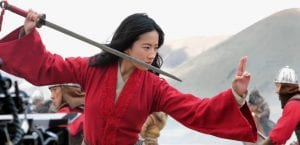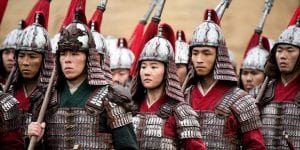Movie Review: Live-action remake of ‘Mulan’ debuts on Disney Plus
Reviewed by Jeffrey Sanzel
Disney has raided its vault over the last several years, producing live-action remakes of some of its most successful animated features. These have included Beauty and the Beast, Dumbo, The Lion King, Cinderella, The Jungle Book, and Aladdin. There are others that are in various stages of development: Snow White and the Seven Dwarfs, The Little Mermaid, Hercules, The Hunchback of Notre Dame, and Pinocchio.
Disney’s latest is Mulan, based on the 1998 cartoon, as well as its source, Ballad of Mulan, by Guo Moaqian.

The premise has remained the same. To defend the country from invaders, the Emperor of China decrees that one man from each family must service in the Imperial Army. Disguised as a man, Mulan takes the place of her war-wounded father. It is a story of inner-strength, loyalty, and bravery in the face of fear.
As a soldier, Mulan reaches her full potential and saves the country, earning both the respect of her family and the citizens of the grateful nation. Mulan takes her place with some of Disney’s stronger female characters, including Merida (Brave), Anna and Elsa (Frozen), and Tiana (The Princess and the Frog).
The original version of Mulan has the classic Disney take. While it deals with serious issues, it leans towards the humorous, aimed at younger viewers: a talking dragon sidekick (Eddie Murphy, basically doing his Donkey from Shrek), a cute cricket along for good luck, singing and dancing ancestral ghosts, and a hodgepodge of goofy soldiers. It builds up to the latter group in drag as concubines, a rather false note in an otherwise entertaining outing that still brings home its messages.
The new version eschews almost all lightness, and, instead, is a more demanding and rough-hewn journey. An added prologue shows the child Mulan and her ability to harness her chi. Chi is defined as “vital energy that is held to animate the body internally.” Here, it is also given an additional mystical context, one in this world that is only associated with men, and, in particular, warriors. Mulan is discouraged by her family to show this power, but it is of value when unleashed in her male persona, Hua Jun.
A great deal of the first half of the film is taken up with the training of the soldiers. Just as in the cartoon, they are taught and challenged and Mulan’s skill and power comes to the surface. This is followed by multiple battles before the final confrontation.

The invaders are lead by Bori Khan, a Rouran warrior leader, who is bent on avenging his father’s death, a man who was slain by the Emperor. His followers are black clad villains who look like Ninja’s by way of Sons of Anarchy. They are being assisted by Xian Lang, a shapeshifting witch with extraordinary abilities; she serves as a sort of mirror image to Mulan. Unfortunately, the interesting parallel is introduced but never fully developed. Unlike the whimsical supernatural components of the original, here they are powerful and often deadly. It is unfortunate that, along with the parallels between Mulan and the witch, they are all left a bit vague.
Mulan also plays a great emphasis on the importance of family. Both versions show this but it is stronger in the new incarnation. The fact that the romantic element from the first film has been removed — there is a faint hint of it — focuses Mulan’s desire to honor family above all else, from beginning to end.
The design is bold and colorful (its biggest nod towards its Disney root), and the settings, shot in China and New Zealand, are expansive and beautiful. Whether village, training camp, or the breathtaking Imperial Palace, there is a wealth of detail. Nothing in the film feels CGI and that is a big point in its favor. It all feels very present.
The cast is uniformly strong and all involved are committed to the material and the world in which the story takes place. The performances come across as honest and, while the dialogue is limited, there is an integrity.

Liu Yifei is superb as Mulan and strikes just the right quality in her alternate guise; she carries the film with the right mix of struggle and pride. Donnie Yen’s Commander Tung makes the Imperial Army leader human. As the almost-love interest, Chen Honghui, Yoson An is easygoing and earnest, in equal turns. Gong Li makes the most of the underwritten witch. Jason Scott Lee’s Bori Khan is a villain with a capital V. Jet Li’s Emperor is both regal and compassionate. Tzi Ma and Rosalind Chao do well with their limited screen time as Mulan’s concerned but loving parents. The assorted recruits are played well-enough but are more types than fully-realized individuals.
Both original and remake were written by a team of writers. Here Rick Jaffa, Amanda Silver, Lauren Hynek, and Elizabeth Martin have taken elements of the 1998 but have fashioned a very different product. They have wisely removed the handful of songs and used them as underscoring as the current version would have made a rather peculiar musical. Niki Caro has directed it with a sure and bold hand. The team have brought out the important theme of the equality of women from a modern point-of-view — but that is in the film’s favor.
The biggest question comes down to this: Who is the audience? It is certainly too dark and too violent for young children. There are many battles with multiple deaths in each one. And while we never see a drop of blood, plenty are shot through with arrows or felled by sword and spear. But adults might find it all too simplistic. There isn’t a great deal of suspense and, with few exceptions, the scenes play to forgone conclusions.
Mulan is sincere and epic and, for the most part, entertaining. Its messages of loyalty and fairness are strong and important. It is stunning to look at and well-acted. But it will remain a film in search of its audience.
Rated PG-13, Mulan is now streaming on Disney Plus.







